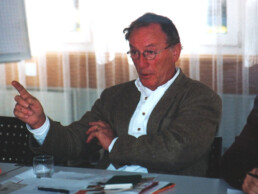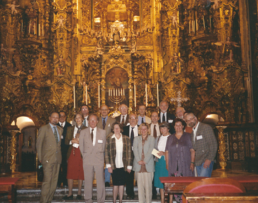The Medicus Mundi International Network mourns the death of its former President Professor Sake Rijpkema (†11 June 2022). Most of you might not remember him. But when I first got in touch with Sake, in the late 1990s, he was still very much at the heart and centre of Medicus Mundi International, although not being President anymore. Since then, and for a long time, he remained a great companion and dedicated supporter of MMI.
As memories fade over time, allow me to present Sake by his own writing. Find below his contribution to a special jubilee annex “50 years of MMI” to the 2013 MMI Annual Report, in which he provides an account of his term as President and the development of Medicus Mundi International in that period – and before. May he rest in peace.
Thomas Schwarz, MMI Executive Secretary, July 2022
Please also refer to the In Memoriam published by Cordaid
…………………
STIMULATING COOPERATION IN BASIC HEALTH SERVICES WITHIN THE DISTRICT HEALTH SYSTEM
By Sake Rypkema, MMI President 1991–1997
To know my motivation to join Medicus Mundi I have to go back to the founding years in the early sixties. Why did we, a group of medical students, long to work in Africa? Was it adventure? Challenge of practicing medicine in all her aspects? Justice and solidarity concerning the deprived?
It was in the late fifties that young nations liberated themselves from the colonial administration. The call of pope John XXIII towards religious congregations (owners of the majority of the private hospitals) to take their challenge and start health facilities in the developing countries was taken seriously. So they did. And they needed doctors. Any practitioner was welcome – not at all a professional approach, but a shame for the catholic medical associations in several European countries. So during a meeting of the International Association of Catholic Doctors in 1961, they put their heads together, stated that qualified and better prepared tropical doctors are needed, as they were not missionaries. Five countries, Spain, Germany, France, Switzerland, Belgium and Holland, took their responsibility, and Medicus Mundi was born.
Not being confessional, having curative and preventive duties, PHC oriented: these are values and goals that are still valid. Not church related meant that MM was not bound to certain birth control rules and could operate also in muslim countries. I was the first doctor who was assisted by the secretary of MM Netherlands to make a contract with a religious congregation. In 1974 I joined the board of MM Netherlands, and in 1978 I was delegated to MMI. 1986 was the year that MM Netherlands became part of Memisa, later Cordaid.
I report about the presidency of Hélène Besson at a different place in this document. As being her successor in 1991, Hélène and me together brought the MMI archives, computer, typewriters pencils and papers to Brussels. And a new approach: Until then we did not have a professional highly qualified secretary. We then got the help of Frederica Wijckmans of MM Belgium, a great value for MMI.
What did Brussels bring us? At least it was much easier to travel for board members and assemblies. The EEC NGO Liaison Committee invited MMI as an observer. The idea was to participate in health matters, particularly the concerning the ACP countries who hat priority in the EEC foreign support. However several MMI members like Misereor, Memisa, Caritas, International, Care were already present and made their own lobby. Further, all was focussed on emergency aid, less on structural approach. Not a straight MMI policy. Moreover, several national branches had their contacts via their national delegates in or around the European Commission. MMI was expected not to intervene in these relations.
Time was changing, from one way traffic as NGO to assist the developing world to a more equal level of partnership. Strengthening local NGOs acting in health matters, health institutions, public health. The call for doctors and other health professionals to work in poor countries diminished, but restructuring of health services (health reforms), decentralization (District Health Service), structural adjustment programs (SAPS) had to be faced. Moreover, NGO institutions at district level operated usually separated from government services, not at all integrated or at least not cooperating. While they should keep hands together to face the challenge of a sustainable PHC.
That is why cooperation with WHO and research became MMI core business. MMI was a well appreciated NGO partner of WHO and its departments. Contacts with related offices and ministers of Health during the yearly World Health Assembly were perfectly maintained by the MMI secretariat (at that time Piet Sleijffers). With the support of ITG Antwerp several studies were performed and the results sometimes put down in WHO statements (cooperation by contracting, capacity building, partner dialogue, sustainability including local health financing). MMI studies were published such as the mail survey 1985 on implementing PHC NGO District Health Systems, and, in 1994, a report on the role of NGO hospitals in PHC and District Health System.
A special event was the presentation to MMI of the Premio Principe de Asturias 1991, comparable with the Nobel price in the Ibero-American community. MMI received the price together with MSF in the category solidarity. The price was presented by the crown prince Don Phelipe, prince of Asturias – a very solemn celebration. Later I was chatting with the queen of Spain who accompanied her son. Wow. The award, indirectly presented to MM Spain, was motivated as follows: “Health promotion over the national boundaries, without discrimination and integrated in the development of the communities in the countries they serve. In fact MMI counts more than 2500 cooperators send out all over the world, is officially recognized by the WHO, where MMI takes part in the Technical Discussions of the World Health Assembly and to where MMI sends her delegates and reporters.”

This recent photo shows Sake with his dear wife Bela Rijpkema-Brom.

Sake Rijpkema during the workshop ‘Health for all in the year 2000’, organized by Medicus Mundi Switzerland in November 1998.

…and a historic photo kindly shared by former MMI President Dr Edgar Widmer. It shows the Board of Medicus Mundi International as guests of former MMI member Fatbenefratelli, in the Granada Basílica de San Juan de Dios, the church where the founder of the Fatebenebratelli is buried. Sake Rijpeman is third from left in the first row.
